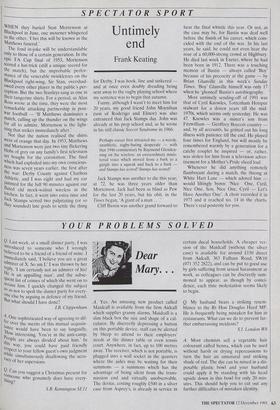SPECTATOR SPORT
Untimely end
Frank Keating
WHEN they buried Stan Mortenson at Blackpool in Junc, one mourner whispered to the other, 'I bet this will be known as the Matthews funeral.'
The fond in-joke will he understandable only to those of a certain generation. In the epic FA Cup final of 1953, Mortenson scored a hat-trick (still a unique record for the match), but the improbable perfor- mance of the venerable twinkletoes on the Blackpool right-wing, Sir Stan, overshad- owed every other player in the public's per- ception. But the two Stanleys sang as one in their tangerine shirts. For a period, as Alan Ross wrote at the time, they were the most remarkable attacking partnership in post- war football — If Matthews dominates a match, calling up the thunder on the wings for all to admire, Mortenson is the light- ning that strikes immediately after.'
Not that the nation realised the shirts were of orange that day. In 1953, Matthews and Mortenson were just two tiny flickering blobs of grey on any family's first television set bought for the coronation. The final which had exploded into my own conscious- ness was seven years earlier, the first after the war: Derby County against Charlton Athletic, and I was eight and had my ear Jammed for the full 90 minutes against our fluted old mock-walnut wireless in the kitchen. In fact, it went into extra time and Jack Stamps scored two palpitating (or so they sounded) late goals to settle the thing
for Derby. I was hook, line and sinkered and at once even doubly dreading being sent away to the rugby playing school where my sentence was to begin that autumn.
Funny, although I wasn't to meet him for 20 years, my good friend John Moynihan (son of Roderigo and Elinor) was also entranced that Jack Stamps day. John was already at his prep school and, as he wrote in his still classic Soccer Syndrome in 1966:
Perhaps soccer first attracted me — a weedy, unathletic, rugby-hating desperate — with that 1946 commentary by Raymond Glenden- ning on the wireless: an extraordinary minis- terial voice which moved from a bark to a gurgle into a squeak and back to a bark and Stamps has scored! Stamps has scored!
Jack Stamps was another to die this year; at 72, he was three years older than Mortenson. Jack had been as blind as Pew for the last 20 years, but his obit. in the Times began, 'A giant of a man ..
Cliff Bastin was another grand forward to
hear the final whistle this year. Or not, as the case may be, for Bastin was deaf well before the finish, of his career, which coin- cided with the end of the war. In his last years, he said, he could not even hear the roar of a 60,000-strong crowd at Highbury. He died last week in Exeter, where he had been born in 1912. There was a touching memoir of Bastin — always called 'Boy' because of his precocity at the game — by Brian Glanville in this week's Sunday Times. 'Boy' Glanville himself was only 17 when he 'ghosted' Bastin's autobiography. '
Most untimely sending-off of 1991 was that of Cyril Knowles, Tottenham Hotspur stalwart for a dozen years till the mid- 1970s, which seems only yesterday. He was 47. Knowles was a miner's son from Fitzwilliam — Geoffrey Boycott country and, by all accounts, he gritted out his long illness with patience till the end. He played four times for England, but will mostly be remembered warmly by a generation for a catchy couplet he inspired — or, rather, was stolen for him from a television adver- tisement for a Mother's Pride sliced loaf.
Whenever he did anything remotely flamboyant during a match, the throng at White Hart Lane — which adored him would liltingly hymn: 'Nice One, Cyril, Nice One, Son, Nice One, Cyril — Let's Have Another One'. A choir recorded it in 1973 and it reached no. 14 in the charts. There's real posterity for you.


































































 Previous page
Previous page